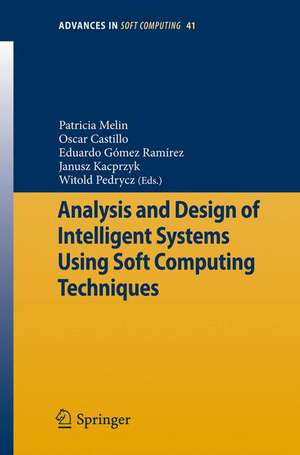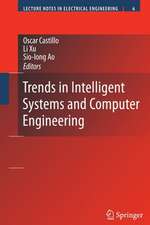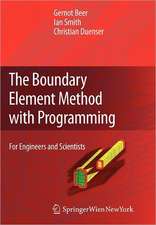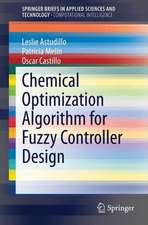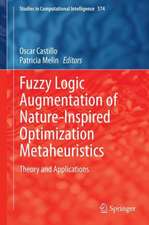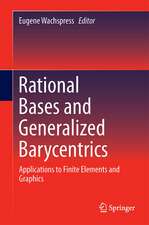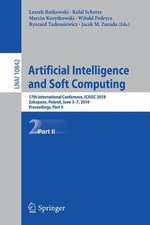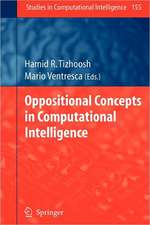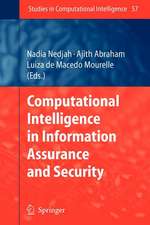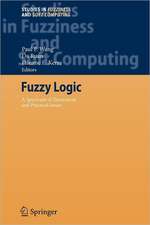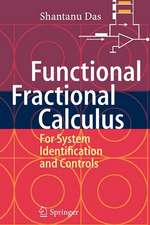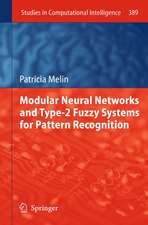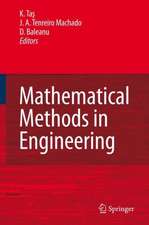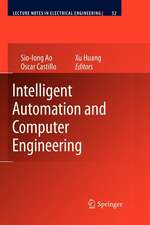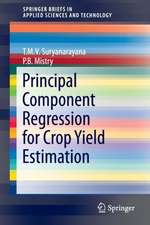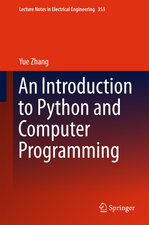Analysis and Design of Intelligent Systems Using Soft Computing Techniques: Advances in Intelligent and Soft Computing, cartea 41
Editat de Patricia Melin, Oscar Castillo, Eduardo G. Ramírez, Witold Pedryczen Limba Engleză Paperback – 5 iun 2007
Din seria Advances in Intelligent and Soft Computing
- 18%
 Preț: 2813.03 lei
Preț: 2813.03 lei - 20%
 Preț: 1273.74 lei
Preț: 1273.74 lei - 18%
 Preț: 1214.72 lei
Preț: 1214.72 lei - 18%
 Preț: 1221.07 lei
Preț: 1221.07 lei - 20%
 Preț: 653.06 lei
Preț: 653.06 lei - 20%
 Preț: 1919.02 lei
Preț: 1919.02 lei - 20%
 Preț: 984.04 lei
Preț: 984.04 lei - 20%
 Preț: 1746.09 lei
Preț: 1746.09 lei - 20%
 Preț: 1906.99 lei
Preț: 1906.99 lei - 20%
 Preț: 1763.75 lei
Preț: 1763.75 lei - 20%
 Preț: 1278.68 lei
Preț: 1278.68 lei - 20%
 Preț: 1926.61 lei
Preț: 1926.61 lei - 20%
 Preț: 3183.20 lei
Preț: 3183.20 lei - 20%
 Preț: 334.86 lei
Preț: 334.86 lei - 20%
 Preț: 1916.55 lei
Preț: 1916.55 lei - 20%
 Preț: 981.25 lei
Preț: 981.25 lei - 20%
 Preț: 1934.70 lei
Preț: 1934.70 lei - 20%
 Preț: 1932.07 lei
Preț: 1932.07 lei - 20%
 Preț: 979.71 lei
Preț: 979.71 lei - 20%
 Preț: 1920.84 lei
Preț: 1920.84 lei - 15%
 Preț: 647.92 lei
Preț: 647.92 lei - 20%
 Preț: 985.86 lei
Preț: 985.86 lei - 20%
 Preț: 641.16 lei
Preț: 641.16 lei - 20%
 Preț: 3174.14 lei
Preț: 3174.14 lei - 20%
 Preț: 1293.71 lei
Preț: 1293.71 lei - 20%
 Preț: 2890.01 lei
Preț: 2890.01 lei - 20%
 Preț: 1924.15 lei
Preț: 1924.15 lei - 20%
 Preț: 1901.71 lei
Preț: 1901.71 lei - 20%
 Preț: 1934.70 lei
Preț: 1934.70 lei - 20%
 Preț: 1918.04 lei
Preț: 1918.04 lei - 20%
 Preț: 1919.02 lei
Preț: 1919.02 lei - 20%
 Preț: 419.25 lei
Preț: 419.25 lei - 20%
 Preț: 1310.68 lei
Preț: 1310.68 lei - 20%
 Preț: 1931.42 lei
Preț: 1931.42 lei - 20%
 Preț: 1941.96 lei
Preț: 1941.96 lei - 20%
 Preț: 2217.66 lei
Preț: 2217.66 lei - 20%
 Preț: 1297.17 lei
Preț: 1297.17 lei - 20%
 Preț: 1295.71 lei
Preț: 1295.71 lei - 20%
 Preț: 1306.07 lei
Preț: 1306.07 lei - 20%
 Preț: 1277.06 lei
Preț: 1277.06 lei - 20%
 Preț: 1909.64 lei
Preț: 1909.64 lei - 20%
 Preț: 668.07 lei
Preț: 668.07 lei
Preț: 1244.89 lei
Preț vechi: 1518.16 lei
-18% Nou
Puncte Express: 1867
Preț estimativ în valută:
238.22€ • 254.73$ • 198.61£
238.22€ • 254.73$ • 198.61£
Carte tipărită la comandă
Livrare economică 18 aprilie-02 mai
Preluare comenzi: 021 569.72.76
Specificații
ISBN-13: 9783540724315
ISBN-10: 3540724311
Pagini: 876
Ilustrații: XXI, 855 p.
Dimensiuni: 155 x 235 x 32 mm
Greutate: 1.23 kg
Ediția:2007
Editura: Springer Berlin, Heidelberg
Colecția Springer
Seria Advances in Intelligent and Soft Computing
Locul publicării:Berlin, Heidelberg, Germany
ISBN-10: 3540724311
Pagini: 876
Ilustrații: XXI, 855 p.
Dimensiuni: 155 x 235 x 32 mm
Greutate: 1.23 kg
Ediția:2007
Editura: Springer Berlin, Heidelberg
Colecția Springer
Seria Advances in Intelligent and Soft Computing
Locul publicării:Berlin, Heidelberg, Germany
Public țintă
ResearchCuprins
Fuzzy Logic as the Logic of Natural Languages.- I: Type-2 Fuzzy Logic: Theory and Applications.- II: Fuzzy Clustering: Theory and Applications.- III: Intelligent Identification and Control.- IV: Time Series Prediction.- V: Pattern Recognition.- VI: Evolutionary Computation.- VII: Fuzzy Modeling.- VIII: Intelligent Manufacturing and Scheduling.- IX: Intelligent Agents.- X: Neural Networks Theory.- XI: Robotics.- XII: Fuzzy Logic Applications.
Textul de pe ultima copertă
This book comprises a selection of papers from IFSA 2007 on new methods for analysis and design of hybrid intelligent systems using soft computing techniques. Soft Computing (SC) consists of several computing paradigms, including fuzzy logic, neural networks, and genetic algorithms, which can be used to produce powerful hybrid intelligent systems for solving problems in pattern recognition, time series prediction, intelligent control, robotics and automation. Hybrid intelligent systems that combine several SC techniques are needed due to the complexity and high dimensionality of real-world problems. Hybrid intelligent systems can have different architectures, which have an impact on the efficiency and accuracy of these systems, for this reason it is very important to optimize architecture design. The architectures can combine, in different ways, neural networks, fuzzy logic and genetic algorithms, to achieve the ultimate goal of pattern recognition, time series prediction, intelligent control, or other application areas.
Caracteristici
Proceedings of the IFSA World Congress 2007 held in Cancun, Mexico June 18- 21 Recent research results in Fuzzy Logic and Soft Computing
